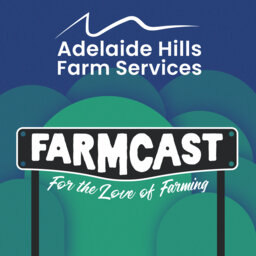Adelaide Hills Farmcast: May Edition
The Adelaide Hills Farmcast
A monthly farming podcast featuring Patrick O’Driscoll (Pods) and Belle Baker sharing a short list of timely jobs that lifestyle farmers could conside…In the Adelaide Hills Farmcast April Edition, Belle Baker looks at farming jobs Adelaide Hills lifestyle farmers should be planning for in May. We'll cover topics such as getting a PIC number, the mating habits of Alpacas and when to look out for red-legged earth mites.
This episode was recorded on the outskirts of Littlehampton at The Littlewood Agapanthus Farm. My generous hosts Tracey and John Cook have been here 6 year and in her own words, Tracey tells me its been a steep learning curve!
And Pods and I have a chat about the availability of fencing products and what this means for you.
We hope you find this show helpful and welcome your comments below or email Belle or Pods at hello@ahfarmservices.com.au
Also, remember that each episode has chapter markers, so when you're playing, you can skip to the next section easily.
00:30 Adelaide Hills Farmcast May Edition
Introduction
02:03 Adelaide Hills Farm Almanac / Farm Calendar
Livestock
Did you know that if livestock is born, sold, sent to an abattoir or kept as pets your property must have a PIC (Property Identification Code) Number. The cost is nominal (currently $93/2 years) and the process is easily completed online via the PIRSA website. The reason I'm suggesting that you get on to this minor administrative job now is that I'm hearing that there is up to an 8-9 week wait for new PIC numbers! If you are keen to move some livestock off your property before it gets too wet or inaccessible it might be a good idea to start the process now!
Alpacas
I recently attended an 'Alpaca New Owners' information day held at Mount Pleasent. It was hosted by the Porter family of Yakka Ridge Alpaca fame and supported by the Australian Alpaca Association. I can honestly say that it was the most wonderfully practical and informative breed 'Open Day' that I have ever attended. I learnt some really interesting facts about Alpacas, their anatomy, management needs and their foibles! I was given a comprehensive handbook on 'Managing Alpacas in Australia' - an easy to read guide that reinforced everything I learned on the day. To their credit, The Australian Alpaca Association encourages all registered breeders to give a copy of this guide to new owners when they sell an Alpaca. This is a fabulous initiative that I would like to encourage other breed societies (cattle, sheep, goats, horses) to consider introducing. Particularly those that are popular among smaller lifestyle farmers.
If you own an Alpaca or three and you haven't given much thought to them aside from shearing them annually, here is a list of things to consider (and a few Alpaca facts that blew my mind!)
- Alpacas are members of the Camel or Camelids family. As such, they have toes, not hooves! Their toes need regular trimming at least 6 monthly – using a pair of garden shears works well.
- Alpaca teeth can need grinding down.
- May is the ideal time to administer their annual vaccine (if you didn’t do it at shearing time) and a drench.
- Alpacas are susceptible to a deficiency in Vitamin D
- If you have or want to get Alpacas to act as Guardians at lambing time, you must introduced them to the flock at least a month before lambing so that they bond with the flock.
- Female Alpaca’s have what’s called induced ovulation. They don’t ovulate regularly like other animals, they only ovulate when a male alpaca is introduced to the yard or paddock
Productive Gardens
- Now is the time to give your garden a bit of love. It’s the perfect time to add fertiliser to your soils and get your garden beds ready for planting again
- It could be a good time to try the lasagna method or Hugalkultur process for putting together your garden beds.
- Look out for snails - they love hiding under your Agapanthus!
Pastures
According to Michael Bowden at Hills Farm Supplies, May is the time to look out for emerging weeds such as capeweed, geranium, flat weed, barley grass and silver grases (to name a few)
- If you're not sure which weeds you have, snap a photo and take it into your local Agri reseller or send it through to us. We're always here to help!
- The window for spraying Blackberry is over for now. We won't be spraying any until November when they are back in their growing phase.
23:15 Farmcast Interview: Belle and Pods and scarcity of fence posts
29:14 Farmcast Co-host: Tracey Cook - Littlewood Agapanthus Farm
May's Farmcast was recorded at the Littlewood Agapanthus Farm with Tracey Cook. Tracey is a self-taught gardener and very happy to share her knowledge. It's a wonderfully animated discussion (Tracey also talks with her hands!) and whilst my personal nemesis is rabbits, Tracey is at war with European Wasps. Keep listening for Tracey's proven method of identifying and getting rid of these horrible insects.
In 1 playlist(s)
The Adelaide Show
A podcast recorded in Adelaide that puts South Australian passion on centre stage with a featured gu…Social links
Follow podcast
Recent clips

427 - This Adelaide Fringe Don't Die Wondering
56:37

426 - Is The ALP Guaranteed Victory In The 2026 South Australian Election?
1:38:59

425 - A Slingsby Life Of Wonder With Andy Packer
2:17:17
 The Adelaide Show
The Adelaide Show